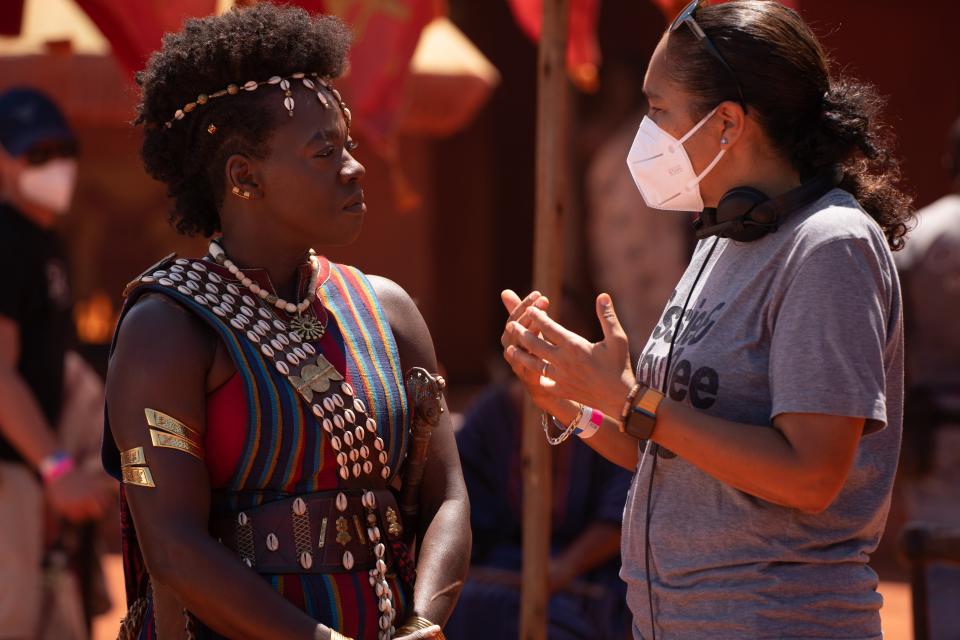'The Woman King' isn't historically accurate. Here's why it's still worth watching
- Oops!Something went wrong.Please try again later.
- Oops!Something went wrong.Please try again later.
All hail Viola Davis.
Davis stars in "The Woman King" as General Nanisca, leader of the Agojie, a group of fearless female warriors who protect the Kingdom of Dahomey under King Ghezo (John Boyega).
If you're wondering why it's not just called "The Queen," it's explained that the people of Dahomey believe in a legend of two kings, a man and a woman who are exact equals, and Nanisca is expected to be crowned Woman King.
This is a new type of role for Davis, who is best known for "The Help," "How to Get Away with Murder," "Fences" and other dramas, but who has never starred in an action film. She does not disappoint.
The film, directed by Gina Prince-Bythewood (“Love and Basketball” and “The Secret Life of Bees),” is inspired by true events, but is mostly fictionalized. So, if you're a stickler for historical accuracies, this film isn't for you. But, if you're a fan of action adventures full of badass women, keep reading.
The story of 'The Woman King'
The film centers around Nanisca as she trains a new cohort of recruits as the Agojie prepare for battle against an enemy who has threatened the kingdom. The women must go through grueling tests to prove that they are fearless and tough, both physically and mentally.
Nawi (Thuso Mbedu) is one of the trainees who stands out because she talks back, refuses to follow orders and isn't ruthless enough. Nanisca sees a lot of herself in Nawi, maybe too much so.
The Kingdom of Dahomey is beholden to the Oyo Empire, and the Agojie must provide those it captures as tributes to the Oyo to be sold into the Atlantic slave trade.
Nanisca is determined to convince the king that trading in palm oil instead of slaves is not only the morally correct choice, but would allow Dahomey to be independent.
However, going against the Oyo doesn't come without its consequences — or casualties.
Coming soon: All the must-see new fall movies
The true story of the Agojie
The Agojie, often referred to as the "Dahomey Amazons," are described as warrioresses who "fight with extreme valor, always ahead of the other troops. They are outstandingly brave … well trained for combat and very disciplined.”
According to The Guardian Nigeria News, they “trained with intense physical exercise" and learned "survival skills and indifference to pain and death."
While this is apparent in the film, the writers take a lot of artistic liberties with the timeline, characters and the nature of the Kingdom of Dahomey's involvement in the slave trade.
As the website History vs. Hollywood put it, “In real life, the Dahomey are much more the villains than the heroes. … The business of slavery is what brought Dahomey most of its wealth. For them, it very much came down to either enslave others or become enslaved yourself.”
Prince-Bythewood told the Hollywood Reporter that was one of the first conversations they had when she joined the film.
She said while they didn't want to shy away from the historical facts, they wanted to tell a story "which is about overcoming and fighting for what’s right. And I think we got it right."

It's OK to enjoy things
Ratings of the film have varied drastically, from a 4/10 star average on IMDb to 100% on Rotten Tomatoes. Many of the criticisms seem to revolve around these historical inaccuracies, but this is not the first time warriors inspired by the Agojie have been portrayed on the big screen.
In a documentary on women warriors, host Lupita Nyong'o, who was once attached to "The Woman King" before her role in "Black Panther," said that the Dora Milaje in the Marvel blockbuster was inspired by the Agojie.
And like "Black Panther," "The Woman King" is art, not documentary. And sometimes art uses historical events and figures as vessels to tell a different story.
The real story of "The Woman King" is about a group of women — Black women — who are celebrated, even revered, for their strength and resilience, and not defined by their femininity or potential as wives and mothers.
As Davis told IndieWire, “People need to see women warriors. In this day and age, in this culture where women are under attack ... I would love for women to tap into that warrior spirit, to know that they have the power to change the narrative. ”
I knew nothing about the real story of the Agojie before I saw "The Woman King." I thought it was a breathtaking, creative and powerful film. And despite knowing the history now, I still do.
"The Woman King" 4.5 stars
Great ★★★★★ Good ★★★★
Fair ★★★ Bad ★★ Bomb ★
Director: Gina Prince-Bythewood.
Cast: Viola Davis, Thuso Mbedu, Lashana Lynch, Sheila Atim and John Boyega.
Rating: PG-13 for "sequences of strong violence, some disturbing material, thematic content, brief language and partial nudity."
Note: In theaters starting Sept. 16.
Contact the reporter at alexis.potter@azcentral.com or follow the reporter on Twitter @alexispotter_.
This article originally appeared on Arizona Republic: 'The Woman King' movie review: Viola Davis dominates as a warrior

